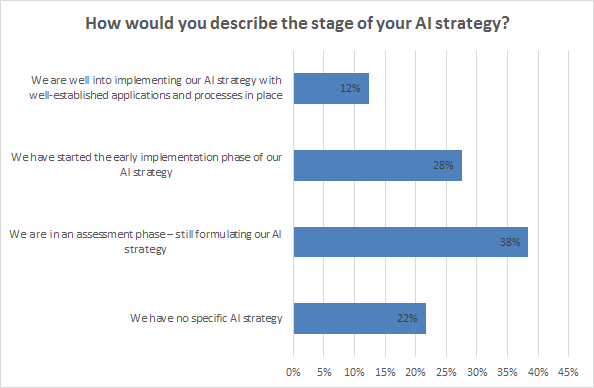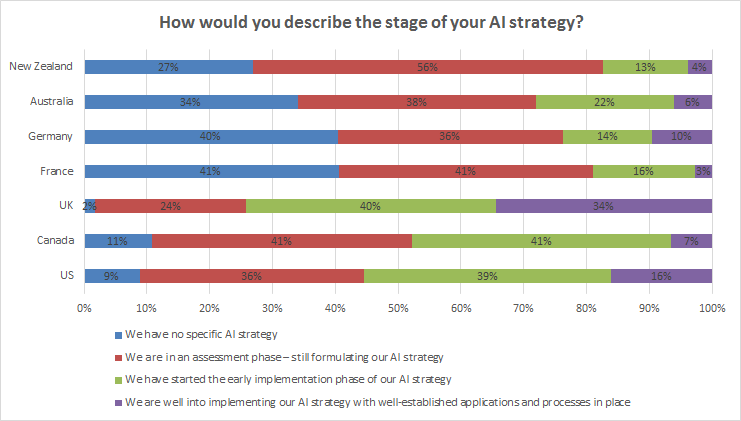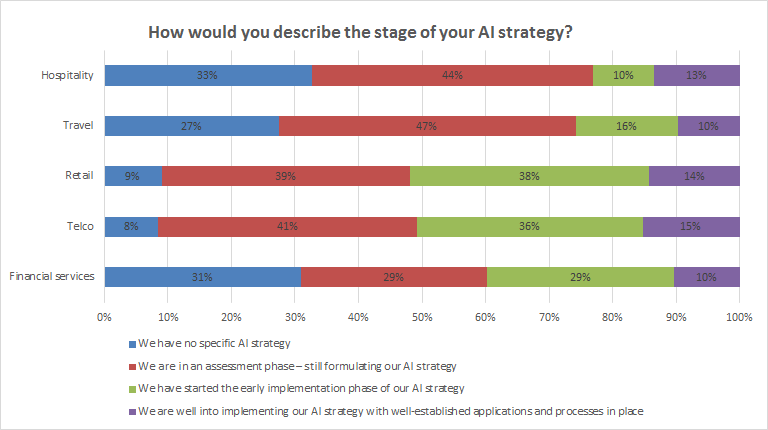Earlier this year, Ovum conducted a survey among customer experience (CX) managers, as well as customer-facing employees (agents and others working inside and outside the contact center) across seven countries covering North America, Europe, and Asia. Included were respondents from five vertical markets — financial services, hospitality, retail, telco, and travel. In addition to examining the changing role of support teams, the pain points and frustrations faced by customer-facing employees, and their use of technology, the survey drilled down into the current state of AI strategies and implementations, as well as future AI plans within the customer engagement segment. The intelligence collected from customer engagement managers displayed significant and interesting levels of readiness and strategic planning implementations by country and vertical markets.
Indications are that customer service agents and other customer-facing employees generally view the advent of AI in their environment in a positive light. A majority of respondents agree that AI will have a positive impact on overall levels of customer satisfaction (64%), will speed up inquiry response times (63%), and increase employee job satisfaction (53%). More than one-third of respondents (38%) added that AI tools will make them look more knowledgeable and professional to their customers. There were only less-than-positive reactions from the 484 customer-facing respondents: 1) that AI tools might make mistakes that could reflect badly upon them (39%), and 2) that AI tools could replace them and other employees (38%).
Despite the generally positive attitude toward the potential impact of AI on CX business operations, and the fact that many believe AI will be a major disruptor of the CX market in the coming two to three years, strategies pertaining to AI assessment and implementation seem to be deficient in a real sense of urgency. As depicted in Figure 1 below, 22% of 341 managers surveyed admit that their company does not have a specific AI strategy, and an additional 38% say they are in an assessment phase of AI and are still working on formulating an AI strategy. Only 12% of CX managers claim they are well into implementing an AI strategy.
Looking at AI strategic initiatives on a country-by-country basis reveals a significant level of disparity among countries in their preparedness on CX AI initiatives. As shown in Figure 2 below, the U.K., the U.S., and Canada appear to be doing the most to prepare for the onset of AI in their CX environments. A clear leader is the U.K., with more than one-third (34%) of CX managers reporting being well into implementing an AI strategy, and an additional 40% saying they have started the early implementation phase of an AI strategy. The U.S. follows with 16% and 39%, respectively. The country ranking in third place in AI preparedness is Canada, with 7% of managers saying their companies are well into implementation and 41% in early implementation phases of AI. Respondents from the remaining countries in the survey, which included Australia, France, Germany, and New Zealand, all reported having significantly more than 50% of their managers still formulating a strategy or currently having no specific AI strategy.
A vertical market view of global AI preparedness also indicates significant differences in AI strategy phases by industry segment. As shown in Figure 3 below, the telco, retail, and financial market segments are most advanced in their stages of AI readiness in terms of strategy development and implementation, while travel and hospitality lag in their attention level to AI. More specifically, a total of 51% of telcos surveyed indicated they were well into implementing an AI strategy (15%) or had started the early implementation phase of an AI strategy (36%). Only 8% of telcos reported having no specific AI strategy.
A very similar AI strategy profile was indicated in the retail vertical. More than half (52%) of retail companies reported being either well into implementing an AI strategy (14%) or having started the early implementation phase of an AI strategy (38%). Only 9% of retailers reported having no specific AI strategy.
The survey revealed a slightly different, although still strong AI strategy profile, for the financial segment. A total of 39% reported they were well into AI strategy implementation (10%) or having started implementing an AI strategy (29%). However, somewhat surprisingly, 31% of financial institutions reported having no specific AI strategy in place at present. This “no AI strategy” percentage is more than three times that of both the telco and retail “no AI strategy” numbers.
Finally, travel and hospitality scored lowest of the three other verticals in AI strategy development. Travel and hospitality reported only a total of 26% and 23%, respectively, of companies being either well into implementation or in early implementation of AI strategies currently. Hospitality showed a relatively large 33% of companies with no specific AI strategy at this time, and travel reported 27% of its companies in that no specific AI strategy category.
Overall, the Ovum research study found CX managers reporting CX AI strategies and implementations in early phases at best, and most agents and customer-facing employees reported still lacking AI tools to assist with their daily functions. Most managers in the survey are still formulating their AI strategy (38%) or only have early-phase plans in place (28%), while almost a quarter (22%) currently admit to having no AI strategy at all. Fifty-seven percent of customer-facing employees overall do not yet have AI tools at their disposal, with those in physical locations outside the contact center being worse off than their counterparts in contact centers. This indicates an opportunity for contact center and AI providers to expand their target market outside of traditional customer service boundaries.
Another key finding of the study is that, even though AI technology is arriving today, and we know much more will be delivered in the coming few years, with few exceptions the development of company AI strategies in the customer care market is somewhat behind schedule. More attention needs to be focused on the planning for how and when AI will be introduced into businesses, and which AI systems and tools will be implemented to optimize CX operations in the future.













